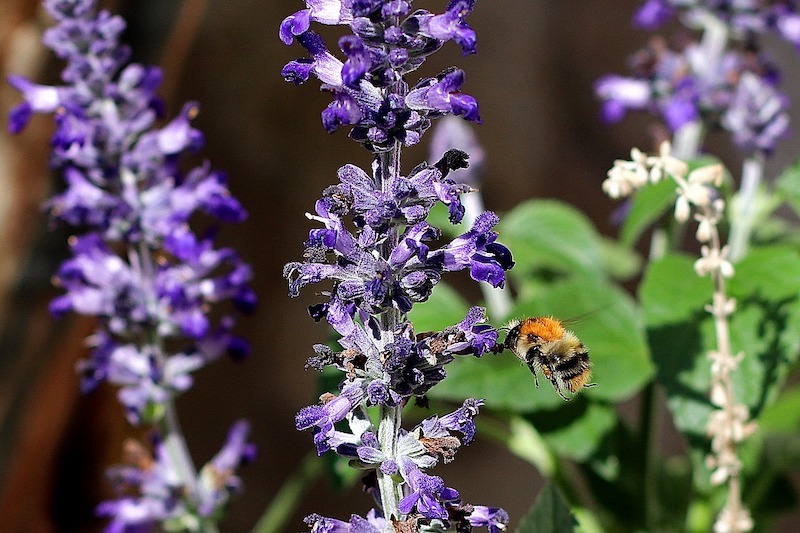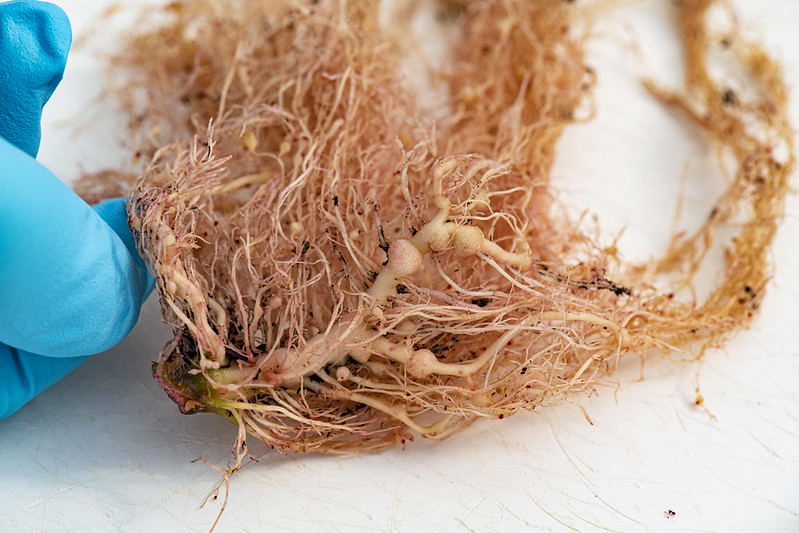Ajuga, commonly known as bugleweed, is an herbaceous perennial that works well as ground cover. It also can be added to rock and wildflower gardens. Relatively tolerant of drought and poor soil, this rapidly spreading plant is ideal for filling in dull, blank outdoor spaces with texture and color. Ajuga is also relatively resistant to deer, rabbits, and even chipmunks.
With Ajuga possessing so many positive traits, does it have any weaknesses? Ajuga is susceptible to two pests: aphids and root-knot nematodes. Knowing how to identify and treat each of these problems will help you quickly get your Ajuga back on track.

Common Ajuga Pests
Aphids
Like many other broad-leaf plants, Ajuga may experience aphid attacks. Aphids are small, soft-bellied insects that feed on plant foliage. They damage Ajuga in two ways: sucking sap from the leaves and excreting a whitish material commonly referred to as honeydew. Honeydew can encourage the growth of black sooty mold, a fungal disease that blocks sunlight to Ajuga’s foliage. If you have noticed holes in Ajuga’s leaves accompanied by stunted growth, you most likely have an aphid problem.
If the outbreak is small, usually a strong spray of water is enough to knock the aphids off for good. However, a more severe infestation may require treatment with an insecticidal soap.
Treating Aphids on Ajuga
To treat a minor infestation, spray the foliage with a strong jet of water. You can also apply Neem oil or an insecticidal soap if necessary. After removing the aphids, prune any dead or damaged foliage and discard them.
On a positive note, aphids attract beneficial insects such as lacewings, predator wasps, and ladybugs. These larger beneficial insects will not only eat the aphids, but also a lot of other pests as well.
Preventing Aphids on Ajuga
The first step to preventing an aphid infestation is keeping Ajuga in good health. Disease and pests often target distressed plants. Regularly water this herbaceous perennial and remove any damaged growth.
You can also use trap plants that either repel or attract aphids. Plants that attract aphids include asters, zinnias, and nasturtium. Plant these species nearby so that aphids will visit these trap plants and leave Ajuga alone. You can also use plants that repel aphids, such as garlic. Finally, if you don’t already have a healthy population of beneficial insects, you can introduce ladybugs (ladybird beetles) and lacewings to your garden.
Root-Knot Nematodes
Root-knot nematodes are microscopic roundworms that attack a variety of plants and live in the soil. They feed on plant roots and lay their eggs there, causing the characteristic knots or galls. The damage prevents the roots from taking up water and transporting nutrients to the above-ground growth.
Affected plants may have stunted and wilted growth. To correctly diagnose the problem, you must examine the roots for knots or send affected plant material to a laboratory. Root-knot nematodes thrive in moist, warm, sandy soil and can multiply quickly under the right conditions.

Treating Root-Knot Nematodes on Ajuga
Treat root-knot disease with organic nematicides, which contain ingredients such as geraniol, saponaria, and azadirachtin. Geraniol is a critical element of several essential oils, such as citronella. Azadirachtin is derived from the seeds of Neem trees. Quillaja saponaria is soap bark and contains saponins.
Preventing Root-Knot Nematodes on Ajuga
Since pests target distressed plants, keep Ajuga healthy by adequately pruning, fertilizing, and feeding it. Remember to use cleaned garden tools while working with Ajuga. Root-knot nematodes are microscopic and easy to transplant from one place to another. Try using trap plants such as French marigolds; mulch with high-nitrogen materials, including shrimp and crab shells; and add products containing beneficial microbes that kill nematodes in the soil.
Ajuga Pests Chart
|
Pest |
Identifying |
Treating |
|
Aphids |
Small, soft-bellied insects that feed on plant foliage |
Spray the affected foliage with a strong jet of water |
|
Root-Knot Nematodes |
Microscopic roundworms that attack a variety of plants and live in the soil |
Use organic nematicides, which contain ingredients such as geraniol, saponaria, and azadirachtin |
Sources:
"Ajuga." Clemson University Cooperative Extension Service. hgic.clemson.edu
"Bugleweed (Ajuga reptans)." University of Illinois Extension. web.extension.illinois.edu/
 |
Author Suellen Barnes - Published 11-21-2023 |
